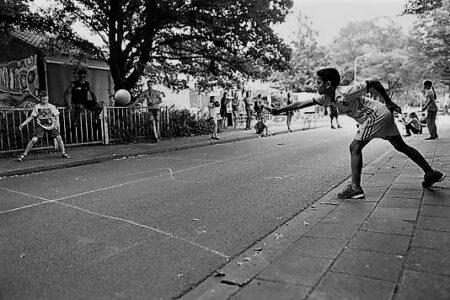
YOU’RE THE DUPE
Written by Bert Plomp
In my early childhood, I’m talking about the 1950s, children used to play outside on the street. Even the buses of GEVU, which regularly passed through Napoleon Square, didn’t stop the kids from frolicking on the street. As far as I know, none of my friends were ever seriously injured while playing.
Playing football was always the number one activity. We did it every day. In addition, we played other ball games in between. One of these games was “curb ball.” Just like in football, we had to first choose the teams. A selection had to be made from the available boys and girls. The captain who won the selection got to choose first from the candidates.
The selection process was quite ruthless each time. The most athletic and skillful players were chosen first, followed by best friends. Those who remained were almost considered a burden. In a game of football, they were used as goalposts or ball boys. You could see those kids looking rather downcast as the choosing process neared its end. Nowadays, this might be considered child abuse, and it would prompt the involvement of the Children’s Ombudsman. Back then, it was just part of growing up, preparing for the big, bad world.
In “curb ball,” the two teams lined up on opposite sides of the street. The player with the ball had to try and throw it against the raised side of the curb on the other side. The bouncing ball had to be caught by the thrower. If successful, you’d score a point for your team and continue until you missed. After a miss, the opposing team took their turn.
Another ball game was called “Kick the Can.” At the beginning, a draw determined who would be the “dupe.” Once decided, someone with a powerful leg would kick the ball as far as possible from a central point.
The “dupe” now had to retrieve the ball and place it back at the launching point as quickly as possible. During the time they were on their way, the rest of the group could hide somewhere nearby.
From the moment the “dupe” placed the ball back, they had to search for the hiders. Once they found someone, they had to loudly announce it, including the person’s name and hiding spot. If someone saw an opportunity to kick the ball while it was unattended, the “dupe” had to start over.
In short, the “dupe” could be sure they’d be running around for a few hours. Occasionally, they would escape the game because they had to go home for dinner.
All of these activities kept children active and free from obesity, which was virtually unheard of at the time. Nevertheless, there were occasionally some overweight boys and girls. They were probably the ones who excelled at hiding and were never the “dupe.”
As a young person, you didn’t pay much attention to someone’s physique and appearance. Taking photos of yourself or having them taken regularly was not even considered.
Photography and filming were reserved for a small group of wealthy individuals. People with long lists of first names, like Bernhard Leopold Friedrich Eberhard Julius Kurt Karl Gottfried Peter Graf von Biesterfeld. Individuals who could afford to go on safaris and spend the entire day with a camera around their neck. Such people were not to be found in Napoleon Square. There was also no big game to hunt there.
Cycling was also a very popular activity. People would ride dozens of kilometers on their bicycles daily. Nothing was too far to pedal to.
Cycling to a football opponent in Zeist, Driebergen, Woerden, or any other place in the vicinity of Utrecht was the norm, regardless of the weather.
Also popular were the little bicycle races around the first block, the first of six in the neighbourhood.
I would complete that course flat out on my bike time and time again, with such exertion that my vision would frequently go black. The fact that no rider ever got hit by a bus during such heated competitions is truly a miracle.
TO BE CONTINUED
For all episodes, click on: Simple pleasures
For more free stories join my Facebook page:

